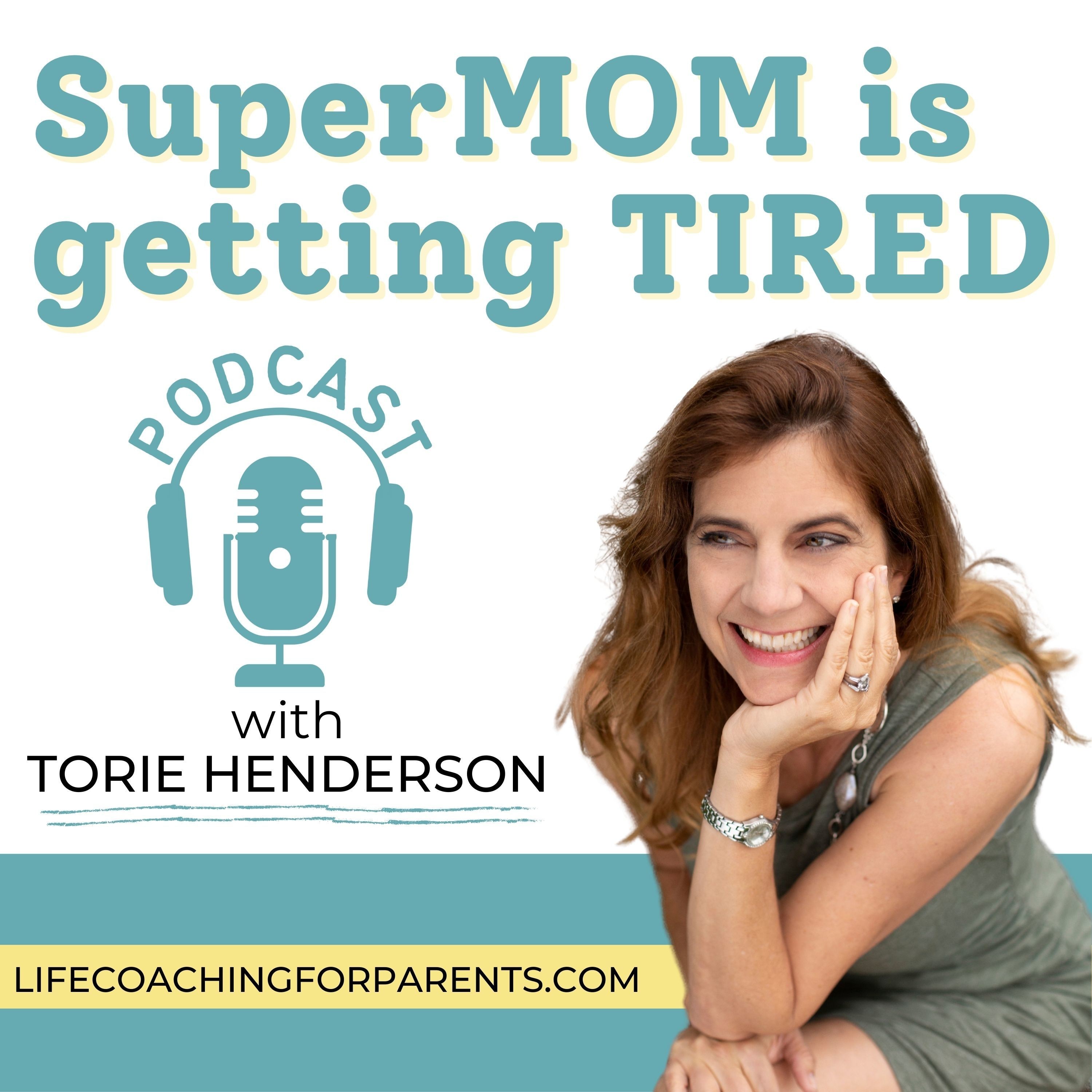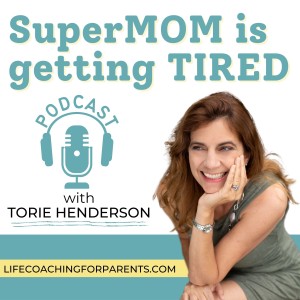
75.1K
Downloads
173
Episodes
You love being a mom but get overwhelmed, lost and resentful by all the parenting responsibilities. Listen as life coach, teacher and parent educator, Torie Henderson, answers common parenting dilemmas from hard working Supermoms. Are you exhausted from working hard all day but still feel like you haven’t accomplished anything? Do you want to feel calm, energized and in control? Then this podcast is for you.
Episodes

Monday Apr 08, 2019
Fighting kids - How to get my kids to stop hating each other
Monday Apr 08, 2019
Monday Apr 08, 2019
Episode #14
Today’s Question:
My middle school kids are constantly fighting. They are close in age (12 and 13) and used to be the best of friends, always playing happily together. Lately, however, it’s been awful. They bicker and are constantly picking on each other, trying to bring the other down. I really want my boys to be friends again! How can I get my kids to stop hating each other? -Sheila
Parent Educator Answer:
If your children used to get along very well, that tells me you did a great job of staying out of their conflicts. Children who are at each other from a young age have figured out how to bring mom into the argument and triangulate the issue. When mom is involved, kids can use siblings to fight for power, control, attention, superiority, etc. (If this sounds like you, or you have other issues with fighting siblings, go to www.lifecoachingforparents.com/record-my-question and tell me about your situation).
There is a lot to talk about with sibling rivalry, and we'll need more than one podcast to cover all the topics.
For this one, I’m going to assume that Sheila is not getting involved, but is just bothered by having to listen to her two precious babies go at each other.
There are many reasons why pre-teens might start picking on their sibling when they didn't before. I want to focus on the two most common and developmentally appropriate reasons for this sudden change.
- Adolescent angst. Puberty does a number on kids. The hormones cause stronger emotional responses and mood swings, making 'walking on eggshells' an everyday situation. Puberty also usually involves hanging out with people who constantly scrutinize and criticize each other’s appearances, performance, speech, and food choices. You name it, some adolescent is judging it. When kids are soaking up everyone else’s negative, insecure emotions like a sponge all day long, they ring it out when they get home. Who is the easiest person to target? Their sibling.
The question I would want to ask my kid is, “Does it work?” If they feel yucky when they get in the car, do they feel better after putting their sibling down and pointing out all their flaws? Maybe it does, maybe it doesn't, either way, teaching your child to reflect on their own words and actions is super powerful.
Whether the answer to the question is yes or no, I would then ask, “Is there another way you can purge the yucky-ness of your day and feel better, that doesn’t involve picking on your sibling?”
Some kids purge verbally, by venting and getting it all off their chest. Some purge physically by hopping on their bike or shooting hoops. Spending time alone, taking a shower, writing in a journal, hanging out with friends, reading a book, are all ways pre-teens have found to feel better after being surrounded by negative people all day.
2. The other reason why you might see an increase in sibling rivalry during puberty is your child (usually the older one) is wanting to create a bigger separation between himself and his sibling. This desire to be seen as older, wiser, different, and more mature grows really strong between 12-15. (This can be seen with twins as well). Adolescence is all about figuring out who you are and who you want to be? When kids are trying to figure out what their interests and skills are or which friend group they feel most comfortable with, they need to wiggle out of their child self like a snake shedding it's skin. It can be hard for a pre-teen to know who they are if they maintain the tight relationship they’ve always had with their siblings, parents, or close friends. The pre-teen years are a time of rapid and massive growth and they need space to figure it all out.
It’s pretty common for kids to “cocoon” as they transform themselves from a kid into an adult. Cocooning can look like being in the bedroom or bathroom for long periods of time with the door closed, wanting more alone time, or cocooning with a best friend and excluding others. The sibling relationship connects to who they were as a child, some kids need to separate from it in order to become the adult they are meant to be. Fighting and constantly putting down a sibling is an effective way to separate.
It’s nice to know why things happen, but what the heck is Mama supposed to DO about it?
Parent Educator Tips for Sibling Rivalry
- Stay out of it. As much as we would like to, we don’t get to decide what kind of relationship our kids are going to have with each other. Their relationship is their’s to figure out and we need to let go of any preconceived idea of what it’s supposed to look like. If your sister is your best friend, you might have expectations for your girls having the same close relationship and get really bothered when they "hate on each other".
- Protect their SAFETY. Wrestling and “horse-play” are great ways for kids to learn boundaries. When kids grow up “rough-housing” they learn about remorse, apologizing, inflicting pain, boundaries, and saying no like you mean it. Generally kids will stop on their own, right at the point where their sibling might get hurt. But, if they have triangulated a parent into it, or are using sibling rivalry to serve themselves in an unhealthy way, they may harm their sibling. Then, it is absolutely the parent’s job to protect the sibling.
- Treat your children as fairly as possible. If they sense favoritism, they may take it out on their sibling. Don’t compare: “Why can’t you be more like your brother?” Don’t label: “She’s the aggressive one, he’s the smart one,” and spend quality time with both.
- Let them see you resolving conflicts in a calm way with other adults.
- Establish house rules like “no hitting or hurting” or “no name calling”. Post them where everyone can see and have consistent consequences when those rules are not followed.
Life Coaching Answer -
Learn all you can about how to responsibly manage sibling rivalry but when it's not working for you, life coaching comes in handy.
Kids fighting with each other is a circumstance. As much as she would like to, Sheila can’t make them change without the kids wanting to change. Wishing they would stop is like going outside everyday and yelling at the weather, telling it that it needs to be different. It might be true. You might be sick of the cold or rain, but feeling annoyed everyday because the weather isn't they way you'd like it is fruitless and only causes suffering for YOU.
Sheila wants them to stop because she doesn’t like how she feels when they are fighting.
She's probably thinking thoughts like...
“I want them to get along like they used to.” (arguing with reality)
or “They shouldn’t be so mean and hateful with each other” (too much negative emotion)
or “I don’t know what to do” (causes confusion).
These thoughts or similar ones cause negative emotions for MOM. It's time to figure out what you have control over and focus on that.
How do YOU want to feel WHEN your kids are fighting?
You get to choose!
Do you want to feel confident? Think the thought “I know what to do here”.
Do you want to feel calm? Then think “I can trust them to work it out”.
Do you want to feel content? Think “This behavior is normal and temporary”.
When you are feeling a positive emotion, you will be more likely to implement the recommendations parent educators have to offer.
Before you are in the situation of your kids arguing, play it out in your imagination. Picture them fighting with each other, and imagine you are staying calm. Imagine evaluating the situation peacefully and objectively, “Do I need to keep him safe?” “Is he just purging the "yuck" he picked up during the day?” “Is he trying to separate himself from the family?” Observe the fighting with a scientific mind, then practice feeling calm/confident or whatever emotion you want to feel. Picture yourself taking action from that place. Imaging making comments appropriate to the situation like, “You guys sure like to fight” or “You must have had a pretty awful day today to be picking on your sister so much” or “Let me know when you are done fighting so I can make us a snack”.
You cannot control your children's relationship but you can decide how you want to feel about it. When you stay calm, and model how to resolve conflicts peacefully, you are showing them another way.
Supermom Kryptonite - Mirror Neurons
We have mirror neurons in our brain that help us connect with the other people in the room. Mirror neurons are what make us smile when a baby smiles at us, or cry in a powerful "This Is Us" episode. When kids are "hating on each other" our default is to "hate on them" or "hate the situation." We default to matching or mirroring the emotions of the people around us unless we do something deliberately different. We think,"You need to stop being so mean to your sister because it's driving me crazy." We think our argumentative teens are making us feel annoyed and frustrated, but our emotions are coming from our brain. Taking time to notice how we are feeling and deliberately overriding these mirror neurons is completely possible and a great thing to model to our adolescents.
Try asking them, "How do you hang out with critical, insecure middle schoolers all day and not let it affect you?" They may not believe you if you tell them how mirror neurons work but this might plant a seed in your teen's brain. When YOU learn to separate your emotions from your kid's emotions, you will be modeling for them, how to separate from other people's negative emotions.
Supermom Powerboost - little ones
Even though you can override other people's negative emotions by setting a clear intention for the feeling you WANT to feel, most of us don't want to work that hard. If you are surrounded by cranky adolescents, go hang out with some little ones. Babies, pre-schoolers or any pre-pubescent kiddo is a joy to be around (especially when you aren't responsible for their well being). When adolescent angst hit my home, I got myself a part-time job at an elementary school. It's much easier to deal with argumentative teens when I spent the day with happy children who write me love notes and get so excited when "Mrs. Henderson" walks by. Do you have nieces or nephews to play with? Could you volunteer once a week or invite the neighbor kids over for a holiday craft? You don't want to ride the emotional roller coaster of adolescence along with your kiddos. Find ways, like hanging out with small children, to keep you separate and balanced so you can be your best self for your teens and pre-teens.
Quote - “Siblings: children of the same parents, each of whom is perfectly normal until they get together.” — Sam Levenson

No comments yet. Be the first to say something!